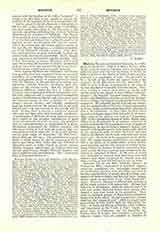

Molinos , MIGUEL DE, founder of Quietism, b. at Muniesa, Spain, December 21, 1640; d. at Rome, December 28, 1696. In his youth he went to Valencia, where, having been ordained priest and received the degree of doctor, he held a benefice in the church of Santo Tomas and was confessor to a community of nuns. He pretended to be a disciple of the Jesuits and quoted them as his authority in his differences with the university. In 1662 he went to Rome as procurator in the cause of the beatification of Venerable Jeronimo Simon. Here, after residing in various other places, he finally took up his abode at the church of Sant’ Alfonso which belonged to the Spanish Discalced Augustinians. The Jesuits and Dominicans having accused him of pernicious teachings, the Inquisition ordered his books to be examined. He defended himself well and was acquitted; but again Cardinal d’Estrees, French ambassador at Rome, acting on instructions from Paris, denounced him to the authorities. In May, 1685, the Holy Office formulated charges against him and ordered his arrest. The report of the process was read on September 3 1687, in the Dominican church of Santa Maria sopra. Minerva, in the presence of an immense concourse of people gathered for the occasion by means of grants of indulgences; he was declared a dogmatic heretic, sentenced to life imprisonment, to be perpetually clothed in the penitential garb, to recite the Credo and one-third of the Rosary, and to make confession four times every year. He received the sacraments on his death bed. He taught interior annihilation, asserting that this is the means of attaining purity of soul, perfect contemplation, and the rich treasure of interior peace: hence follows the licitness of impure carnal acts, inasmuch as only the lower, sensual man, instigated by the demon, is concerned in them. In the cases of seventeen penitents he excused their lascivious acts, and claimed that those committed by himself were not blameworthy, as free will had had no part in them.
Innocent XI, in the Bull “Coelestis Pastor” (November 2, 1687), condemned as heretical, suspect, erroneous, scandalous, etc., sixty-eight propositions which Molinos admitted to be his, being convicted of having asserted them in speech and in writing, communicated them to others, and believed them—propositions which are not those of the “Guia Espiritual” alone. Moreover, the pope prohibited and condemned all his works, printed or in manuscript. Molinos had followers in abundance; when he was arrested, it is said that twelve thousand letters from persons who consulted him were found in his possession. More than two hundred persons at Rome found themselves implicated in the affair; several communities of nuns practiced the “prayer of quiet”, while the inquisitorial proceedings in Italy lasted until the eighteenth century. In Spain the Bishop of Oviedo, taken to Rome and imprisoned in the Castle of Sant’ Angelo, the priest Juan de Causadas, and the Carmelite lay brother Juan de Longas, who corrupted a convent of religious women, were all punished as disciples of Molinism. In France, the semi-quietism of Fenelon and Jeanne Guyon (q.v.) took from Molinos only the teaching of “pure love”. Among the writings of Molinos may be mentioned the following: (I) “La devocion de la buena muerte” (published at Valencia, 1662, under the name of Juan Bautista Catala); (2) “La Guia espiritual” (published first in Italian, at Rome, 1675, then, in Spanish, at Madrid, 1676), approved by various theologians and by ecclesiastical authority, so much so that twenty editions appeared in twelve years, in Latin (1687), French, English (1685), German (1699), etc.; (3) “Tratado de la Comunion cuotidiana” (1687).
ANTONIO PEREZ GOYENA

